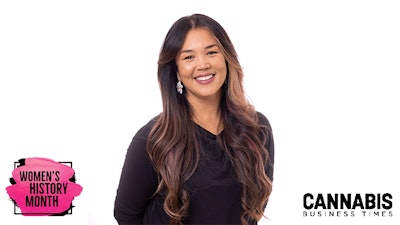
Tori Cole, vice president of marketing at Cookies, knows the power of a good story. That sense of narrative connection between a brand and a customer is at the very heart of what Cookies has been building in California and across the U.S. cannabis market.
The success of a brand like Cookies, however, does not happen overnight. Nor does it happen without a willingness to listen to the marketplace.
Cole grew up in Hawaii in a traditional Japanese household. Her siblings got into the tech industry as adults, and she followed soon after—landing in the Bay Area scene and working at several companies like Intuit and Mesh Brands before cannabis called out to her.
While working as the Go-To-Market Leader at Mesh Brands, Cole met Cookies founder and CEO Berner, who was busy launching Lemonnade. A connection was forged, and Cole joined Cookies in April 2019.
RELATED: Sharing Knowledge and Empowering People In The Cannabis Industry: Q&A with Berner
“At the heart of everything we do, it's all about the quality genetics, and Berner is super actively involved,” she says. “He selects every cultivar and really sets our brand strategy. He’s even the creative director when it comes to our strain illustrations, which are like our own billboards on packaging. Everything that we do centers not only on the customer and their experience—but really on staying true to our roots.”
Cole and her team work closely with Berner to translate his tastemaker’s perspective into a clear marketing strategy in an industry that’s not exactly open to traditional marketing tools. That’s where the creative touch matters, she says. Without access to typical print or digital advertising, brands must take it upon themselves to develop their own identifiable image.
The cultivars that have become Cookies’ calling cards—Gary Payton, Cereal Milk, Pancakes—each have their own signature look. That begins with photography and advances into graphic design and then, ultimately, customer engagement on platforms like Instagram or even in-store conversations with Cookies budtenders.
“Everything that a consumer would want to care about from the beginning—the life of a cultivar—we start to build,” Cole says.
She points out that Cookies is a flower company, first and foremost; that’s a guiding principle in the business’s expansion from state to state. In early April, for instance, Cookie is opening its Ann Arbor, Michigan, dispensary. The company’s portfolio of “flavors” is billed as a main attraction in social media posts leading up to the opening.
This marketing strategy, built around fresh cultivars and exclusive product drops, was honed in California—but it works well in emerging state markets across the country. Customers want intrigue; they want a story.
“What you really see coming through in our marketing strategy is really a connection to the customer and also where we came from,” Cole says. “It’s a lot of emphasis on our core values, which are really respecting and honoring the plant and our legacy.”
Still, Cookies is very much rooted in California’s cannabis culture. Even as the company grows, that legacy of California operations in more traditional market settings has helped inform how and why Berner’s creative oversight shapes the brand. With a licensed nursery in California, Cookies genetics land first on retail shelves in the Golden State. What appears as a new flavor in, say, Michigan, is often a touted cultivar that ran the gauntlet in California first.
But, however a customer finds their way to Cookies, Cole says that she’s noticed how important brand affinity is. She sees customers “voting with their wallets” in new state markets—putting their money behind a meaningful transaction with a brand that’s gaining some level of trust.
“Customers really expect more from the brands that they interact with and engage with,” she says. “We found that consumers like to decide how and when they engage with the brand—and it’s the same thing for the products. We try to be as approachable and as available as possible. That means making sure they if have questions, they get an answer either through a very educated budtender or even going online and exploring.”
Those very educated budtenders, of course, are key to the success of the brand’s connection with a broader audience. Cookies often works with on-the-ground partners in new states. Take Cookies Worcester, for instance, in Massachusetts. The operator is a beneficiary of the state’s Economic Empowerment Initiative, which eases access points for entrepreneurs who’ve been disproportionately affected by the war on drugs.
“He gave his first round of dispensary profits back to the community,” Cole says of the Cookies Worcester operator. “He really wants to leverage Cookies as a platform to give and create a path for other folks like him—or growers or anybody involved in the game moving from the illicit to the regulated market. A lot of what we do is to really serve those communities, and that's what we actually see with a lot of our consumers. They care and they notice that we care, too.”
It's that social equity fault line that Cole sees as critical in the industry. Cannabis can lift up whole communities—Cole has seen it in her work with Cookies. This includes women representation in the business.
“Coming from tech, I have a different and unique perspective on that, I think,” Cole says. “And I’m also a woman of color. I personally observed and actually felt the reality of what we face in America today. Specifically within cannabis, though, my observation has been one of tremendous diversity. Even our founders come from minority groups and the legacy market, which has been the basis of how we've grown up as an organization and our ethos and how we operate. I actually get to see the culture shifting every day for the better, even though I know that we have a long road ahead of us when it comes to gender and racial equity.
“What I see at Cookies is incredible,” Cole adds. “About 50% of the CEO staff at the leadership meetings that we have every week are women. Each of us have a seat at the table and really drive decisions and shape strategy and what we prioritize I together as a company.”
More and more, as cited in CBT’s recent Best Cannabis Companies To Work For features, this diversity is vital to the long-term health of a business. Cole adds that companies should ensure that their women executives are not just working in HR departments; rather, all executive functions should be open to women.
Important lessons like that—which often go unseen by the consumer segment of the market—are at the heart of Cookies U, which is part of the company’s workforce development initiative at the corporate campus in Humboldt County, Calif. That initiative will expand across the U.S. in the future, too, Cole says, looking ahead to the future with optimism and excitement.


















